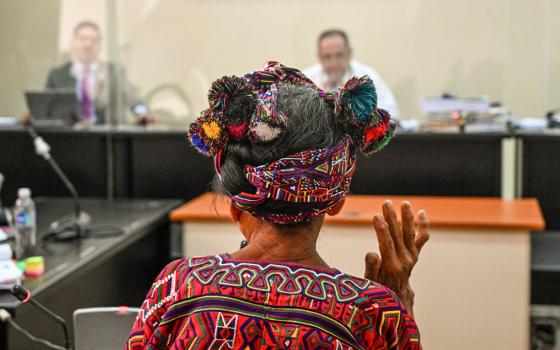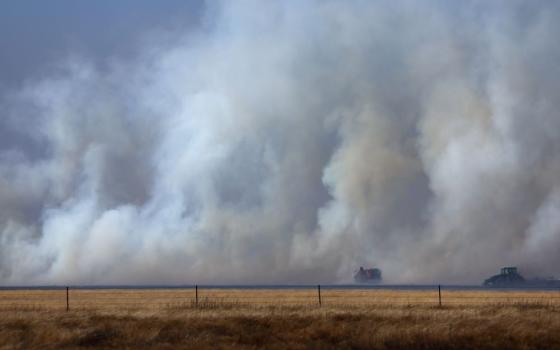Speaking for the last time to the clergy of the diocese of Rome as their bishop, Pope Benedict today said there must be a distinction between "true" and "virtual" interpretations of the Second Vatican Council.
Additionally, said the pope, press members covering the years following the 1962-65 meeting of bishops were responsible for "trivializing the idea of the Council."
Now, only fifty years after its opening, the pope continued, can the faithful see the "true Council...emerging with all its spiritual strength."
The Second Vatican Council, called by Pope John XXIII, involved nearly all the world's bishops and resulted in a bevy of documents on the role and function of the church in the modern world.
Although some documents addressed issues closer to the Catholic norm, such as the structure of the Mass, others have been widely seen as a foundational shift in the church's focus.
Those familiar with the state of Catholicism since the Council are well aware that interpretations of it have long rankled the wider church.
In some circles, a certain clear division has emerged: Some say the council was a clean break from the church's past, others claim it was more a reaffirmation of 19 centuries of church history.
While it's impossible to judge a person's viewpoints from one speech, the pope today seemed to clearly favor the latter view.
Writing on Benedict's remarks today, NCR's John Allen reported that the pope told his clergy he lamented some interpretations of the council, which he said had been unduly espoused by the press.
"There was the Council of the Fathers - the true Council - but there was also the Council of the media," Benedict said, according to a transcript of his remarks provided by Vatican Radio.
"The media saw the Council as a political struggle, a struggle for power between different currents within the Church," said Benedict. "It was obvious that the media would take the side of whatever faction best suited their world."
"There were those who sought a decentralization of the Church, power for the bishops and then, through the Word for the 'people of God,' the power of the people, the laity," the pope said.
"These translations, trivializing the idea of the Council, were virulent in the practice of implementing the liturgical reform, born in a vision of the Council outside of its own key vision of faith," said the pope.
Benedict continued:
And we know that this Council of the media was accessible to all. So, dominant, more efficient, this Council created many calamities, so many problems, so much misery, in reality: seminaries closed, convents closed liturgy trivialized ... and the true Council has struggled to materialize, to be realized: the virtual Council was stronger than the real Council.
But the real strength of the Council was present and slowly it has emerged and is becoming the real power which is also true reform, true renewal of the Church. It seems to me that 50 years after the Council, we see how this Virtual Council is breaking down, getting lost and the true Council is emerging with all its spiritual strength.
And it is our task, in this Year of Faith, starting from this Year of Faith, to work so that the true Council with the power of the Holy Spirit is realized and Church is really renewed. We hope that the Lord will help us. I, retired in prayer, will always be with you, and together we will move ahead with the Lord in certainty. The Lord is victorious.
It may not be too much to say that some liturgists would take issue with the outgoing pope's understanding of the council's intentions.
In one example, a recently deceased renowned liturgist took a starkly different tack in a 2011 speech.
Identifying a movement some call the "reform of the reform," or an intentional attempt by church leaders to revise the Council's reforms, Benedictine Fr. Anscar Chupungco said then that such a movement "carries an agenda that can have a regrettable impact on the liturgical gains of the council."
"Dark clouds are forming ominously on the western horizon," Chupungco, who died at age 73 in January 2013, said in 2011 while accepting the highest honor of the Federation of Diocesan Liturgical Commissions of the United States of America.
"They move hurriedly and decisively toward the direction of the sun that burns radiantly in the sky," said Chupungco, who had once served as president of the Pontifical Liturgical Institute and as a consultor to the Vatican congregation tasked with first translating the Latin Mass into English.
"[The clouds] cast upon it their somber shadows to hide it from view," he said. "Suddenly it is dusk before the appointed time. In reality however the dimness is caused by the passing clouds. I am confident that these cannot put the clock back to yesterday's evening hours."
It seems whoever the cardinals in conclave elect to replace Benedict may be tasked with determining just exactly which way that clock is ticking.
[Joshua J. McElwee is an NCR staff writer. His email address is jmcelwee@ncronline.org.]




